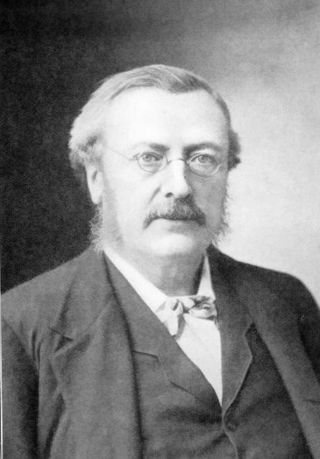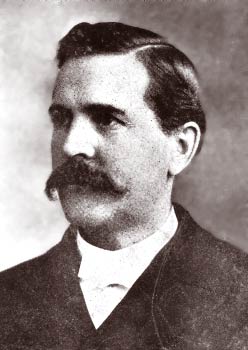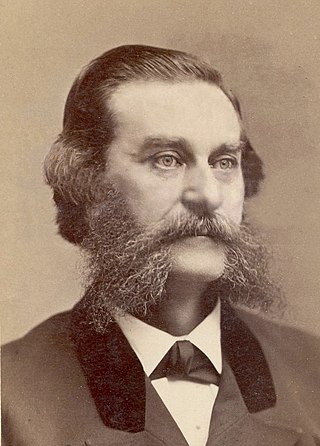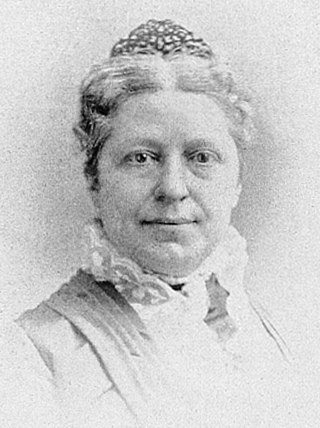
Herbert Lincoln Clarke was an American cornetist, feature soloist, bandmaster, and composer. He is considered the most prominent cornetist of his time.
The New England League was a mid-level league in American minor league baseball that played intermittently in five of the six New England states between 1886 and 1949. After 1901, it existed in the shadow of two Major League Baseball clubs in Boston and alongside stronger, higher-classification leagues.

Nathan Fellows Dixon III was a United States representative and Senator from Rhode Island.

Edward Solomon was an English composer, conductor, orchestrator and pianist. He died at age 39 by which time he had written dozens of works produced for the stage, including several for the D'Oyly Carte Opera Company, including The Nautch Girl (1891). Early in his career, he was a frequent collaborator of Henry Pottinger Stephens. He had a bigamous marriage with Lillian Russell in the 1880s.

Frederic Archer was a British composer, conductor and organist, born in Oxford, Oxfordshire, England. He studied music in London and Leipzig, and held musical positions in England and Scotland until 1880, when he became organist of Plymouth Church in Brooklyn, New York.

Royal Chapin Taft Sr. was a US politician and businessman, whose served as the 39th Governor of Rhode Island from 1888 to 1889. He was a member of the Taft political family; as a descendant of Robert Taft Sr., he was a distant cousin of President of the United States William Howard Taft.

Aram Jules Pothier was an American banker and politician of French Canadian descent. He served as the 51st and 55th Governor of Rhode Island.

Stone, Carpenter & Willson was a Providence, Rhode Island based architectural firm in the late 19th and early 20th Centuries. It was named for the partners Alfred Stone (1834–1908), Charles E. Carpenter (1845–1923). and Edmund R. Willson (1856–1906). The firm was one of the state's most prominent.

Charles Franklin Sprague was a U.S. Representative from Massachusetts, grandson of Peleg Sprague (1793–1880).

Fred A. Hillery was an early leader in the American Holiness Movement; the founding president of the South Providence Holiness Association; the founding pastor of the People's Evangelical Church, the "mother church of the Church of the Nazarene in the East"; a co-founder of the Central Evangelical Holiness Association and also of the Association of Pentecostal Churches of America; one of the founders of the Pentecostal Collegiate Institute ; one of the founding fathers of the Church of the Nazarene; and the publisher of holiness periodicals and books.
William A. Howland was an American operatic bass, voice teacher, composer, conductor and university administrator. He was the head of the music department at the University of Michigan from 1900-1914. In 1914 he co-founded the Detroit Institute of Musical Arts; serving as the school's vice-president and head of the vocal department until his death 31 years later.

Thomas Smith Webb was the author of Freemason’s Monitor or Illustrations of Masonry, a book which had a significant impact on the development of Masonic Ritual in America, and especially that of the York Rite. Webb has been called the "Founding Father of the York or American Rite" for his efforts to promote those Masonic bodies.

Carl Zerrahn was a German-born American flautist and conductor. His widespread activity in the region made him an influential figure in New England and Boston classical music, especially choral music, in the latter half of the 19th century. He was especially successful in the presentation of the great oratorios and the management of large choruses.

Clifton A. Hall (1826-1913) was an American architect from Providence, Rhode Island.

Gena Branscombe was a Canadian pianist, composer, music educator and choir conductor who lived and worked in the United States.

The Germania Musical Society (1848–1854) was an orchestra that performed in the United States in the mid-19th century. Its musicians emigrated from Germany after a successful tour of England. Carl Lenschow and Carl Bergmann served as directors. The group toured throughout the country. Concerts took place in the Melodeon and the Music Hall, Boston; Brinley Hall and City Hall, Worcester, Massachusetts; Astor Opera House, New York City; Metropolitan Hall, New York City; Ocean Hall, Newport, Rhode Island; Westminster Hall, Providence; and elsewhere.

Frank Fuller Olney was the 18th mayor of Providence, Rhode Island. He served from 1894 until 1896.
Frank W. Angell (1851–1943) was an American architect practicing in Providence, Rhode Island.

Charlotte White Hawes was an American composer, lecturer, music educator, poet and critic from Massachusetts. "God Bless the Soldier", written in 1890, was dedicated to the Grand Army of the Republic.
Ruth Erskine Tripp was an American composer, music critic, educator, and pianist. She administered the Works Progress Administration's Federal Music Project in the state of Rhode Island from 1940 to 1943.
















